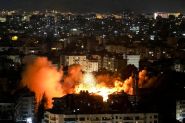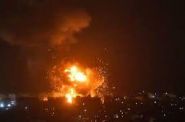- Home
- War in the Middle East
- The Times: Israeli Army Develops Plans to Invade Southern Lebanon

The Israeli army has reportedly formulated plans for a ground war in southern Lebanon, despite the potential escalation into a broader conflict. Western allies have urged Israel to exercise restraint, according to The Times.
"The operation aims to push Hezbollah forces in southern Lebanon north of the Litani River, a line of symbolic importance for both sides," said The Times on Monday. The main motive is that Israeli politicians and military experts cannot accept a lenient ceasefire with Hezbollah following the ongoing conflict in Gaza.
Approximately 86,000 Israelis have fled the border region with Lebanon since the start of the clashes, and a senior Israeli military officer suggested that "many may not return home even if the ceasefire takes effect."
An Israeli military official stated to The Times, "What happened in Gaza cannot be compared to what Hezbollah could do in the north. The decision regarding a ground operation across the borders lies with Prime Minister Netanyahu and his war cabinet."
Jonathan Conricus, the spokesperson for the Israeli army, emphasized that "the situation cannot return to what it was before October 7." He added that the Israeli army was "prepared and increasing its readiness" and that "the Chief of Staff of the Israeli army has approved the plans and timetables set to prepare the army."
On Sunday, the Israeli Minister of Defense, Yoav Gallant, stated, "If Hezbollah escalates by one level, we will go up five." This statement represents one of Israel’s various threats to Hezbollah if they were to provoke a potential war. The Israeli army perceives the evacuation of civilian residents from the border area "as a form of surrender to Hezbollah."
Initial fears that the conflict would spread more seriously to other fronts were lowered when Hassan Nasrallah, Hezbollah’s leader, said that the group would not launch a major offensive unless provoked or unless Hamas was on the verge of an overwhelming defeat.
"The operation aims to push Hezbollah forces in southern Lebanon north of the Litani River, a line of symbolic importance for both sides," said The Times on Monday. The main motive is that Israeli politicians and military experts cannot accept a lenient ceasefire with Hezbollah following the ongoing conflict in Gaza.
Approximately 86,000 Israelis have fled the border region with Lebanon since the start of the clashes, and a senior Israeli military officer suggested that "many may not return home even if the ceasefire takes effect."
An Israeli military official stated to The Times, "What happened in Gaza cannot be compared to what Hezbollah could do in the north. The decision regarding a ground operation across the borders lies with Prime Minister Netanyahu and his war cabinet."
Jonathan Conricus, the spokesperson for the Israeli army, emphasized that "the situation cannot return to what it was before October 7." He added that the Israeli army was "prepared and increasing its readiness" and that "the Chief of Staff of the Israeli army has approved the plans and timetables set to prepare the army."
On Sunday, the Israeli Minister of Defense, Yoav Gallant, stated, "If Hezbollah escalates by one level, we will go up five." This statement represents one of Israel’s various threats to Hezbollah if they were to provoke a potential war. The Israeli army perceives the evacuation of civilian residents from the border area "as a form of surrender to Hezbollah."
Initial fears that the conflict would spread more seriously to other fronts were lowered when Hassan Nasrallah, Hezbollah’s leader, said that the group would not launch a major offensive unless provoked or unless Hamas was on the verge of an overwhelming defeat.
Read more



Comments